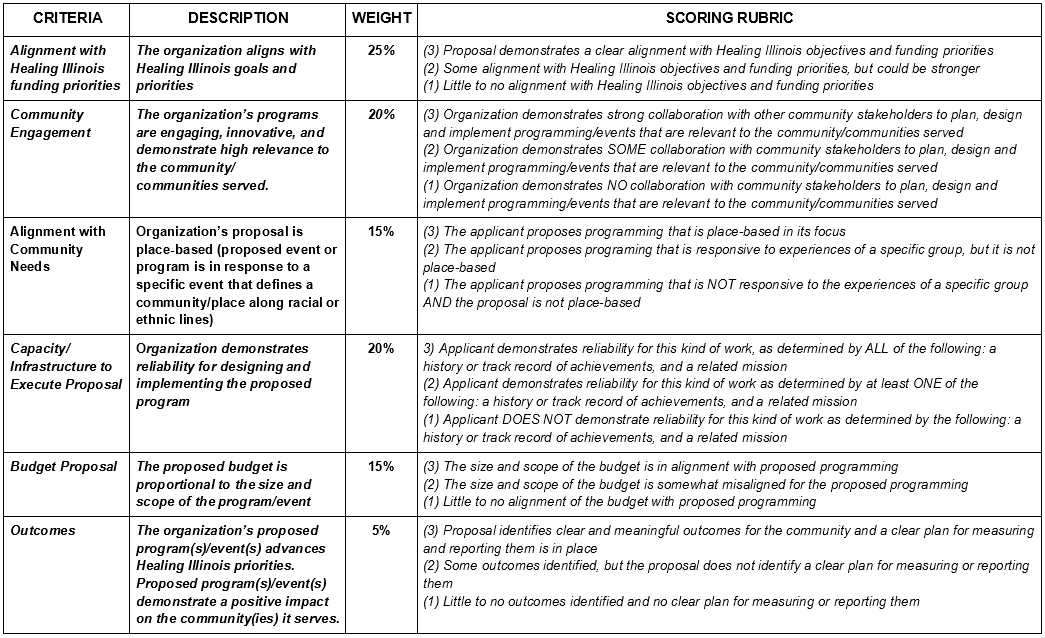DESCRIPTION
Healing Illinois is a racial healing initiative of the Illinois Department of Human Services (IDHS), in partnership with The Field Foundation of Illinois, designed to distribute $4.5 million grants to organizations across the state to begin, or continue, the work of racial healing.
As the Intermediary for Region 5, the Southern Illinois Community Foundation encourages applicants to call our office for assistance.
REQUIREMENTS
In order to be eligible, applicant must be a nonprofit organization with a with evidence that it has been recognized by the Internal Revenue Service as an organization described in Section 501(c)(3) of the Code, and in good standing with the Illinois Secretary of State, or part of a school or other local governmental agency.
Applicants must be located in or project must be directed to communities in the Illinois Department of Humans Services Region 5 counties (see map below or Click Here).
Grants must be expended by June 30, 2024 with a grant report.
The Healing Illinois grant is available to organizations that will use the money in one of the following ways:
Racial Healing Sustainability: activities designed to build community through knowledge-sharing, deeper interpersonal interactions, and intentional spaces for collective healing. Types of projects may include, but not limited to:
-
-
- – Projects that build deeper interpersonal interactions through racial healing circles, peace circles, restorative justice practices, etc.
- – Expansion of existing racial healing programs
- – Creative artistic activities, including community-wide murals, visual artistic events, exhibitions, storytelling and discussion that advance racial healing.
- – Leadership development initiatives for racial healing practitioners, organizers and leaders of color in relation to racial healing, power-building, and community advocacy.
-
Narrative Change: awareness building of racial healing and justice work to facilitate the engagement, leadership, and activation of residents most impacted by systemic racism. Types of projects may include, but not limited to:
-
-
- – Workshops to teach community members how to share their personal stories to active others for systemic change
- – Amplify truth narratives of communities most impact by systemic racism.
- – Storytelling programs to build understanding and empathy
-
Education and Training: enhancing knowledge and understanding of racial healing and justice via trainings focused on anti-racism, racial equity, racial justice, etc.
Racial Healing Readiness: developing the capacity and early-stage ideas that may lead to new programming and projects with long-term vision to advance racial healing. Types of activities include community consultation, issues identification and research, assessment or feasibility studies for expanding programs and projects, increasing group or organizational capacity through specific skills training and/or new tools.
Promoting dialogue: supporting and facilitating conversations that build connection, understanding, and empathy within and across communities
-
-
- Examples: On the Table-type events, facilitated conversations, opportunities to engage in dialogue with the broader community.
-
Encouraging collaboration: people coming together in person or virtually to connect and engage in racial healing activities
-
-
- Examples: racial justice campaigns; creative artistic activities, including community-wide murals, virtual artistic events, storytelling, and discussion.
-
Facilitating learning: Engaging in projects that build and/or enhance knowledge and understanding of racial justice.
-
-
- Examples: trainings, technical assistance, (external) purchase of educational materials for community-wide programming, (internal) purchase of educational materials for staff, board, volunteers and stakeholders.
-
Seeding connection: Building community through deeper interpersonal interactions
-
-
- Examples: racial healing circles, peace circles, restorative justice activities.
-
Frequently Asked Questions
Collaborative Projects
We’re a group of organizations and would like to apply for a larger grant, What is the limit for grant amounts?
There is no set limit. Organizations submitting a proposal as a collective must demonstrate that their program is collaborative in nature and must make the case on how they will spend the funds by June 30, 2024. In addition, we will prioritize collaborative projects that reach various communities and regions.
Am I better off applying for $30,000 as an individual organization or as part of a group of three and we apply collectively for $90,000?
An organization does not have better odds of being awarded a grant by applying with a group of nonprofits versus solo. Proposals will be evaluated based on their alignment with the four Healing Illinois funding priorities, organization capacity to implement the proposed project, and project scope and proposed budget.
Can you apply for a grant and also be part of a collaboration in a separate grant?
Yes, but the projects have to be clearly distinct, and the use of funds has to be clearly distinct as well.
Can we sub grant to a collaborating organization?
No. You can reimburse for program expenses that are distinctly provided by the collaborator. However, an organization can not receive funding from 2 separate grants for the same work/expenses. The project has to be clearly distinct, and the use of funds has to be clearly distinct as well.
In the application if we check no for the question, “Is this a collaborative project?” Can we just put that into the partnership question?
All fields in the application are required. If your proposed project is not a collaborative project, check No and enter “Not applicable” in the partnership questions.
Can we find a map that would help show the 5 regions?
Yes, the regional map may be accessed here: Illinois Regional Map.
General Questions
When are applications due?
Applications are due December 1.
Will provider that received funding through your agency have to provide quarterly report to your agency?
There are no quarterly reports. Region 5 grantees will have up to 3 check-in meetings and will be required to provide a final report by June 30, 2024.
Are past grant recipients eligible to apply this year?
Absolutely, we encourage previous sub-grant recipients to apply for funding this year.
What is the grant size? Range?
Organizations are welcomed to apply for up to $30,000.
How will funds be disbursed?
Depending on grant award amount, the funds may awarded in up to 3 disbursements.
What is the start date of the grant?
The start date of the grant is November 1, 2023.
Can a public school within a district apply, or does it have to be through the district?
It will vary by school district, but yes, a public school may apply for funding. We encourage schools to get clarity from their school district in seeking funding.
Who is the funder Field Foundation or IDHS?
The statewide funder for Healing Illinois is the Field Foundation of Illinois, who was awarded the Healing Illinois grant from the Illinois Department of Human Services (IDHS). SICF was designated the intermediary for Region 5.
Proposed Activities
For proposals focused on racial healing activities, what support will be provided beyond funding, if any, to ensure the success of these initiatives (i.e. recommended facilitators etc.)
SICF and the Healing Illinois team will be providing technical assistance support to sub-grantees throughout the tenure of the grant. We want to ensure all organizations are successful in the implementation of their projects.
For proposals focused on education and training, could the funds be used for materials already purchased (i.e. Justice at Work), or must they be used for new training materials/facilitators/initiatives?
Remember the grant period begins November 1. Organizations may charge expenses against the grant as long as it’s connected to the project proposal and meets the date criteria
Can an organization with multiple programs that align to the priorities apply for each program, or only once?
We encourage organizations to submit a comprehensive application rather than submitting multiple applications for each funding priority.
Can the “education and training” work be internal (with staff), or should it all be external (with constituents)?
Both, the work can be internal and/or external.
I have a question on this funding if it can be used for immigration crisis. I work near the police station. I know that resources we can provide is very limited.
Funding must be used in alignment with the funding priorities. We encourage organizations to think about the intersection of issues with racial healing and justice work. However, if an organization would like to use the funds to support direct service work, for example, a food pantry – that would not be eligible.
Will art-based projects be considered and given equal importance as any project?
Absolutely. Projects will be evaluated like any other project based on the following criteria:
- Funding priorities
- Community engagement
- Alignment with community needs
- Capacity/Infrastructure to implement proposal
- Budget proposal
- Outcomes
Cost Questions
Can I include indirect cost?
Yes, up to 10%.
What are allowable costs?
Allowable costs are charges incurred by your organization to support the implementation of a grant award. The Field Foundation follows guidelines stipulated by IDHS; costs must meet the following general criteria to be allowable:
- Be necessary and reasonable for your organization to implement the grant award
- Be allocable to the grant award under the provisions of the applicable cost principles
- Be consistent with policies and procedures that apply uniformly to grant awards and other activities of your organization
- Treat direct and indirect costs consistently
- Be in accordance with generally accepted accounting principles (GAAP)
- Not used to meet the cost sharing or matching requirements of another grant award.
- Be adequately documented
- Incurred during the period performance and consistent with the approved award budget
To learn more visit Allowable Costs page, and to view the Allowable Costs Presentation click here.
Are there any costs that are not allowed as part of this grant?
Typically, unallowable costs include:
- Advertising costs – unless necessary to meet the requirements of the sponsored agreement.
- Alcohol costs – strictly unallowed
- Fundraising costs – including financial campaigns, endowment drives, solicitation of gifts and similar expenses that are typically incurred to raise capital or obtain contributions.
- Insurance costs – insurance to protect against defects in the institution’s materials or workmanship are unallowable. Losses which could have been covered by insurance are unalloyed unless expressly allowed by the sponsor.
- Recruiting costs – including wanted advertising, special emoluments, fringe benefits and salary allowances incurred to attract professional personnel from other institutions.
- Selling and marketing costs – only allowable as a direct cost when approved by the awarding agency and deemed necessary for the performance of the award.
- Lobbying costs – strictly unallowed.
To learn more about unallowed costs visit the State of Illinois Code and the Uniform Guidance: Unallowed Costs.
Can we use funding and expenses from before December notification to reimburse ourselves?
Organizations may charge against the grant starting November 1 as long as it’s in direct connection with the grant proposal.
GATA Questions
Do we need to be GATA certified?
No. GATA certification is not required for applications to Region 5.
Rubric

ARE YOU
READY?
The Southern Illinois Community Foundation engages the people of our region in building a tradition of philanthropy. We are committed to creating an opportunity for donors to participate in local community development efforts to address the changing needs of our community through charitable giving.

